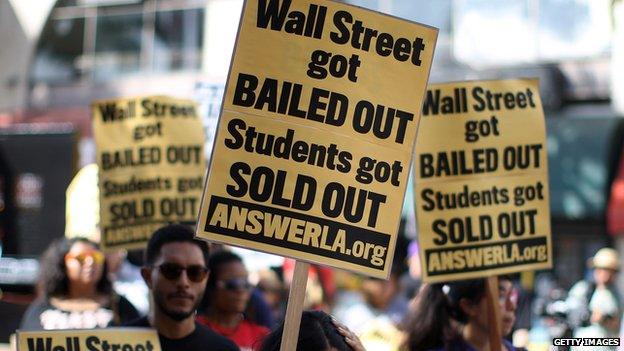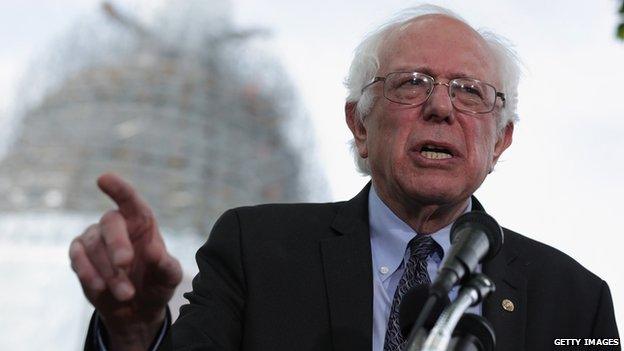A call to default on student loans
- Published

Lee Siegel has stopped paying his student loans, and he's calling for millions of Americans to follow his lead.
The author, a 62-year-old veteran of prestigious publications such as the New Republic, New Yorker and Harper's, explains in a New York Times opinion piece over the weekend that the high amounts of debt he had to take on to attend a "small private liberal arts college" and then Ivy League graduate school degrees presented him with a dispiriting choice.
"I could give up what had become my vocation (in my case, being a writer) and take a job that I didn't want in order to repay the huge debt I had accumulated in college and graduate school," he writes. "Or I could take what I had been led to believe was both the morally and legally reprehensible step of defaulting on my student loans, which was the only way I could survive without wasting my life in a job that had nothing to do with my particular usefulness to society."
And so he chose to default - and he says he's happy with his decision. He's so happy, in fact, that he thinks other Americans should follow his lead. Before they do that, however, he has some words of advice, since student debt is subject to collection until the day you die (after, even, external).
"Get as many credit cards as you can before your credit is ruined," he writes. "Find a stable housing situation. Pay your rent on time so that you have a good record in that area when you do have to move. Live with or marry someone with good credit."
Once you're prepared, you can cut yourself loose from the burden of student loans and, maybe, help bring down a system that he says enriches banks, universities and "greedy vulture" collection agencies on the backs of the poor.
He concludes: "If people groaning under the weight of student loans simply said, 'Enough,' then all the pieties about debt that have become absorbed into all the pieties about higher education might be brought into alignment with reality."

Total US student debt now exceeds $1.15 trillion
Reaction to Siegel's piece has been heated, to say the least. Questions surrounding the duties and obligations of debt - as a piece of the debate over wealth inequality - are becoming some of the most divisive in US society.
On one side are those who view banks and the "1%t" as getting off easy - with special breaks and rules that apply only to them - while the poor and middle classes are fodder for an unsympathetic system.
One the other side are those who think people like Siegel are shirking their responsibilities - at society's expense.
Recall, for instance, that it was an Obama administration programme to forgive mortgage debt in 2009 that prompted the rant by CNBC's Rick Santelli which gave birth, external to the grass-roots conservative Tea Party movement.
"This is America," Santelli famously said. "How many of you people want to pay for your neighbour's mortgage that has an extra bathroom and can't pay their bills?"
When couched in similar terms - how many Americans want to bear the burden of their neighbour's student loan default? - the response from many is predictable.
"Like Lee Siegel, I came from a lower middle-class background," writes, external Patrick Frey of the blog Patterico's Pontifications. "So did my wife. Like many, many other Americans in our circumstances, we paid our student loan debts. Siegel doesn't get to default on his and pretend his shameful abandonment of his obligations is justified."
Kenneth Ballard, writing, external on his blog, says the idea that you can default on student loans because you didn't end up in a rewarding career isn't just foolish, it's dangerous.
"It places the burden on loan writers and colleges to not only guarantee an education, but guarantee a future career for the students," he writes, external.

Presidential candidate Bernie Sanders has called for loan-free US college education
Sonny Bunch of the Washington Free Beacon goes further, external, calling Siegel a sociopath in an article illustrated by a photo of Bane, the Batman villain who cloaked his criminal schemes in populist rhetoric.
"The whole essay drips with a massive amount of self-regard," he writes. "Seriously, bro, I think the world of letters would manage to survive without your contributions; even if it couldn't, if TS Eliot could write The Waste Land whilst holding down a job at a bank, you probably could've committed your scribblings to the page too."
Life isn't fair, writes, external RedState's Erick Erickson.
"The best things in life are not free," he writes. "That includes education. Lee Siegel could have met his obligations. He could do so now. He did not chose life. He chose, essentially, to steal and now to brag about it."
Jordan Weissmann of Slate says, external the New York Times should apologise for running Siegel's "deeply irresponsible" piece containing "criminally negligent financial advice".
"Astoundingly, Siegel never mentions, nor demonstrates that he understands, the fact that in most cases of default the government can simply start garnishing up to 15% of borrowers' disposable wages directly from their paychecks," he writes.
Perhaps the Times editors approved Siegel's piece because they think the debate could use a bit of his bomb-throwing.
The numbers on US student debt, after all, are truly staggering. The average 2015 US university graduate who took out loans to help pay for tuition enters the workforce with $35,000 (£23,000) in student debt. In the US total student debt exceeds $1.15 trillion - dwarfing, for instance, the nation's credit card debt. According to, external the Wall Street Journal, in 2013 175,000 people had wages withheld to pay off defaulted student loan debt.
It's why a proposal for free college education like that of Democratic presidential candidate Bernie Sanders makes waves and a BBC article about Americans who can get low-cost college education in Germany quickly goes viral.
On the Republican side, candidates are also advancing education reform proposals - albeit with an eye toward private, not government solutions. Florida Senator Marco Rubio, for instance, has proposed income-based loan repayment and allowing private investment in a student's college education in exchange for a portion of a graduate's future earnings.
The education system in the US could end up being incrementally fixed, from politicians operating within the system.
Or, if people like Siegel have their way, it could be brought crashing to the ground.
From chaos comes progress. Or maybe more chaos.